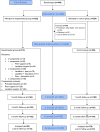A multi-component intervention to support breastfeeding in Lebanon: A randomized clinical trial
- PMID: 31199849
- PMCID: PMC6568407
- DOI: 10.1371/journal.pone.0218467
A multi-component intervention to support breastfeeding in Lebanon: A randomized clinical trial
Abstract
Background: Effective evidence-based breastfeeding support interventions can bolster breastfeeding practices. This study investigated the effect of a multi-component breastfeeding support intervention delivered in hospital and home settings on six-month exclusive breastfeeding (EBF) relative to standard care.
Methods: This is a parallel group, randomized clinical trial, in which 362 healthy pregnant women with singleton pregnancy were randomly allocated to a multi-component intervention that included antenatal breastfeeding education, professional, and peer support, delivered in hospital and home settings for six months (experimental, n = 174), or to standard care (control, n = 188). The primary outcome was six-month EBF rate. Secondary outcomes were exclusive and any breastfeeding rates at one and three months, maternal breastfeeding knowledge, attitude, and behavior at six months, and satisfaction with the intervention.
Results: The crude six-month EBF rate was similar in both groups (35.2% vs. 28.1% in the experimental and control groups, respectively, p = 0·16). In adjusted analysis, six-month exclusivity was twice as likely in the experimental group relative to standard care (OR = 2.02; 95%CI: 1.20 to 3.39); whereas the odds for any breastfeeding were similar. Participants compliant with all three components were six times more likely to practice EBF for six months relative to standard care (OR = 6.63; 95% CI: 3.03 to 14.51). Breastfeeding knowledge of the experimental group, at six months, was significantly improved compared to the control. No changes were observed in breastfeeding attitude or behavior.
Conclusions: Combining education with peer and professional breastfeeding support improved six-month breastfeeding exclusivity and knowledge.
Conflict of interest statement
The authors have declared that no competing interests exist.


